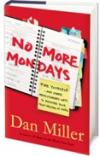Is work just something we have to do to get to the weekend, or can it be a true expression of what God has called us to do? Does God only call a few people, and are those people always on staff in churches or on the mission field? Do the rest of us just work to support the few who are called? The Bible gives dignity to any work. There are no non-sacred occupations:
"God has given each of you some special abilities; be sure to use them to help each other, passing on to other's God's many kinds of blessings."
I Peter 4:10 (LB)
Could you tell me what success means for you this year? Are you where you thought you'd be at this stage of your life? Have you ever had a sense of "calling" in your life? How did you hear that calling? Is your work a fulfillment of your "calling?" Do you go home at night with a sense of meaning, purpose and accomplishment?
St Augustine said: "To work is to pray." God established work before the fall. God placed the first humans in the garden to "tend and keep it." This work assignment was given before sin entered the world and God pronounced the curse.
God blesses work even after the fall. If work were evil, God would never encourage people to engage in it. In Colossians 3:23we are told to "work hard and cheerfully at all you do, just as though you were working for the Lord and not merely for your masters (bosses)." (LB)
God expected us to enjoy our work! Even Solomon in his most pessimistic moments realized this. "That everyone may… find satisfaction in all his toil - this is the gift of God." (Ecclesiastes 3:13) Work that fulfills our "calling" will be energizing and uplifting.
God is saving the greatest rewards for eternity - and work will be among them. Surprise! The saved will "build houses", "plant vineyards", and shall "long enjoy the work of their hands." (Isaiah 65:25)
Thank God It's Friday relays a secular work ethic. For the Christian, work should be meaningful and an expression of who we are. It has been said that the true measure of a person is not what he does on Sunday, but who he is Monday through Saturday, and that includes what we do in our work.
There are 3 components that must be blended in our work in order for it to be an expression of our calling. (Keep in mind, your goal is to develop a strategic life plan, not just a career path.)
Skills and Abilities (What)
The most common mistake people make in choosing a career is to do something simply because they are good at it. Remembering the happiest times in your life and the times when you felt most fulfilled are better indicators of your calling than just knowing what you have the ability to do. You must have the ability, but that's only one component.
Personality Traits (How)
How do you relate to other people, projects, and ideas? Are you analytical and logical, or expressive and outgoing? Are you nurturing, supportive and encouraging or do you thrive when you are working on a project in isolation? There is no "right" or "wrong" here, but understanding your uniqueness will help identify the best environment.
Values, Dreams and Passions (Why)
Are you motivated by the constant search for new knowledge? Are you moved by beauty in nature and your surroundings? What are you drawn to even when money is not an issue? What is it that when you are doing it, time just flies by? What God calls us to do does not stamp out who we are. Look for moments of being in the zone, like an excellent athlete. Remember Eric Liddle, who when challenged to come back and do missionary work rather than run competitively, said: "God made me fast and when I run, I feel His pleasure." (From the movie, Chariots of Fire.)
Knowing these 3 areas about oneself leads to a sense of continuity. These components are relatively changeless; however the career application can change multiple times. Knowing that the average job is about 3.2 years in length, it is not even appropriate to try to identify the "right" job. Rather, we need to get a broader sense of the role work plays in a balanced and meaningful life. A critical issue is to distinguish between the following terms:
1. Vocation - from the Latin vocare, which means "to call"
This is the big picture; the most profound. Vocation must incorporate "calling," "purpose," "mission" and "destiny." It's what you're doing in life that makes a difference, that builds meaning for you, and that you can look back on in your later years to see the impact you've made on the world.
2. Career - "to run or move at full speed, rush wildly. Careen"
"Career" comes from the Latin word for "cart" and later from the Middle French word for "racetrack." In other words, you can go around and around really fast for a long time but never get anywhere. That's why in today's volatile work environment, even professionals with careers like physicians, attorneys, CPAs, dentists and pastors may choose to get off the expected track and choose another career. A career is a line of work, but it's not necessarily your calling. You can have different careers at different points in your life that all support your "calling".
3. Job -- one's daily activities
A job is the most specific and immediate of the three terms. It has to do with one's daily activities that produce an income or a paycheck. The dictionary defines "job" as "a lump portion, a task, chore or duty." In today's workplace, the average person will have 14-16 different jobs in his/her lifetime. Thus the job surely cannot be the critical definition of one's calling or vocation. However, the job should in fact be an expression of that calling and an integration of one's ministry.
Here's a worthy goal:
"The master in the art of living makes little distinction between his work and his play, his labor and his leisure, his mind and his body, his information and his recreation, his love and his religion. He hardly knows which is which. He simply pursues his vision of excellence at whatever he does, leaving others to decide whether he is working or playing. To him he is always doing both." James Michener
Originally posted Sept. 13, 2005.

Dan Miller is today's leading authority and personality on careers and 'Work You LoveTM'. As bestselling author of 48 Days To The Work You Love, and now No More Mondays, Dan reaches over a million people every month ia his newsletter, podcast, and blog with the best trends and opportunities in the workplace and small business. For more information, visit http://www.48days.com.








